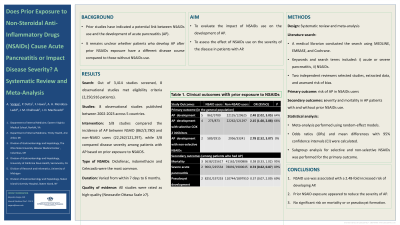Monday Poster Session
Category: Biliary/Pancreas
P1718 - Does Prior Exposure to Non-Steroidal Anti-Inflammatory Drugs (NSAIDs) Cause Acute Pancreatitis or Impact Disease Severity? A Systematic Review and Meta-Analysis
Monday, October 28, 2024
10:30 AM - 4:00 PM ET
Location: Exhibit Hall E

Has Audio

Alejandra Vargas, MD
Eastern Virginia Medical School
Norfolk, VA
Presenting Author(s)
Alejandra Vargas, MD1, Priyata Dutta, MD2, Fadi Hawa, MD3, Antonio Ladd, MD4, Jean M. Chalhoub, MD5, Jorge D. Machicado, MD6
1Eastern Virginia Medical School, Norfolk, VA; 2Trinity Health Ann Arbor Hospital, Ypsilanti, MI; 3University of Michigan, Ann Arbor, MI; 4University of California Davis, Albuquerque, NM; 5Northwell Health, Staten Island, NY; 6University of Michigan Health, Ann Arbor, MI
Introduction: Prior studies have suggested that NSAIDs can potentially cause acute pancreatitis (AP). However, the risk of AP from exposure to NSAIDs in the general population has not been precisely estimated. Moreover, it is unclear if patients who develop AP and had prior exposure to NSAIDs have a different disease course to those with AP without NSAIDs use. Thus, we conducted a systematic review and meta-analysis to evaluate the impact of NSAIDs use in the in the development of AP and its disease severity.
Methods: A medical librarian conducted a literature search of MEDLINE, EMBASE, and Cochrane Central. Two reviewers independently screened studies, abstracted data, and evaluated the risk of bias. We included full-text population-based studies that compared the incidence of AP in individuals with or without NSAIDs use. The primary outcome was to estimate the risk of AP from NSAIDs use in the general population. Secondary outcomes aimed to compare disease severity and mortality among patients with AP with and without prior exposure to NSAIDs. A meta-analysis was conducted using random-effect models. Subgroup analysis for selective COX-2 inhibitors and non-selective NSAIDs was performed for the primary outcome.
Results: Of 3,414 studies screened, 8 observational studies met eligibility criteria, encompassing 2,250,916 participants. Five studies compared the incidence of AP between NSAID (862/3,780) and non-NSAID users (22,262/121,297). Compared to non-NSAID users, those with NSAID use had 2.48-fold greater risk of developing AP (OR=2.78; 95%CI 2.52-3.07; p< 0.001; I2=64%). The increased risk for AP was similar for non-selective NSAIDs (OR=2.48; 95%CI 2.02-3.05; p< 0.001; I2=0%) and selective COX-2 inhibitors (OR=2.15; 95%CI 1.60-2.88; p< 0.001; I2=66%). Three studies compared disease severity among patients with AP based on prior exposure to NSAIDS. Prior NSAID exposure was associated with lower risk of severe AP (OR=0.74; 95%CI 0.62-0.87; p 0.003; I2=89%), but not with significantly different risk of mortality (Table 1).
Discussion: In this meta-analysis, we found that the use of NSAIDs was associated with a 2.48-fold greater risk of developing AP. Contradictorily, prior exposure to NSAIDs appeared to mitigate disease severity among those who developed AP. Clinicians should recognize the risk of AP associated with NSAID use. Future studies are needed to explore the protective role of NSAIDs on the severity of AP.
Note: The table for this abstract can be viewed in the ePoster Gallery section of the ACG 2024 ePoster Site or in The American Journal of Gastroenterology's abstract supplement issue, both of which will be available starting October 27, 2024.
Disclosures:
Alejandra Vargas, MD1, Priyata Dutta, MD2, Fadi Hawa, MD3, Antonio Ladd, MD4, Jean M. Chalhoub, MD5, Jorge D. Machicado, MD6. P1718 - Does Prior Exposure to Non-Steroidal Anti-Inflammatory Drugs (NSAIDs) Cause Acute Pancreatitis or Impact Disease Severity? A Systematic Review and Meta-Analysis, ACG 2024 Annual Scientific Meeting Abstracts. Philadelphia, PA: American College of Gastroenterology.
1Eastern Virginia Medical School, Norfolk, VA; 2Trinity Health Ann Arbor Hospital, Ypsilanti, MI; 3University of Michigan, Ann Arbor, MI; 4University of California Davis, Albuquerque, NM; 5Northwell Health, Staten Island, NY; 6University of Michigan Health, Ann Arbor, MI
Introduction: Prior studies have suggested that NSAIDs can potentially cause acute pancreatitis (AP). However, the risk of AP from exposure to NSAIDs in the general population has not been precisely estimated. Moreover, it is unclear if patients who develop AP and had prior exposure to NSAIDs have a different disease course to those with AP without NSAIDs use. Thus, we conducted a systematic review and meta-analysis to evaluate the impact of NSAIDs use in the in the development of AP and its disease severity.
Methods: A medical librarian conducted a literature search of MEDLINE, EMBASE, and Cochrane Central. Two reviewers independently screened studies, abstracted data, and evaluated the risk of bias. We included full-text population-based studies that compared the incidence of AP in individuals with or without NSAIDs use. The primary outcome was to estimate the risk of AP from NSAIDs use in the general population. Secondary outcomes aimed to compare disease severity and mortality among patients with AP with and without prior exposure to NSAIDs. A meta-analysis was conducted using random-effect models. Subgroup analysis for selective COX-2 inhibitors and non-selective NSAIDs was performed for the primary outcome.
Results: Of 3,414 studies screened, 8 observational studies met eligibility criteria, encompassing 2,250,916 participants. Five studies compared the incidence of AP between NSAID (862/3,780) and non-NSAID users (22,262/121,297). Compared to non-NSAID users, those with NSAID use had 2.48-fold greater risk of developing AP (OR=2.78; 95%CI 2.52-3.07; p< 0.001; I2=64%). The increased risk for AP was similar for non-selective NSAIDs (OR=2.48; 95%CI 2.02-3.05; p< 0.001; I2=0%) and selective COX-2 inhibitors (OR=2.15; 95%CI 1.60-2.88; p< 0.001; I2=66%). Three studies compared disease severity among patients with AP based on prior exposure to NSAIDS. Prior NSAID exposure was associated with lower risk of severe AP (OR=0.74; 95%CI 0.62-0.87; p 0.003; I2=89%), but not with significantly different risk of mortality (Table 1).
Discussion: In this meta-analysis, we found that the use of NSAIDs was associated with a 2.48-fold greater risk of developing AP. Contradictorily, prior exposure to NSAIDs appeared to mitigate disease severity among those who developed AP. Clinicians should recognize the risk of AP associated with NSAID use. Future studies are needed to explore the protective role of NSAIDs on the severity of AP.
Note: The table for this abstract can be viewed in the ePoster Gallery section of the ACG 2024 ePoster Site or in The American Journal of Gastroenterology's abstract supplement issue, both of which will be available starting October 27, 2024.
Disclosures:
Alejandra Vargas indicated no relevant financial relationships.
Priyata Dutta indicated no relevant financial relationships.
Fadi Hawa indicated no relevant financial relationships.
Antonio Ladd indicated no relevant financial relationships.
Jean M. Chalhoub indicated no relevant financial relationships.
Jorge Machicado indicated no relevant financial relationships.
Alejandra Vargas, MD1, Priyata Dutta, MD2, Fadi Hawa, MD3, Antonio Ladd, MD4, Jean M. Chalhoub, MD5, Jorge D. Machicado, MD6. P1718 - Does Prior Exposure to Non-Steroidal Anti-Inflammatory Drugs (NSAIDs) Cause Acute Pancreatitis or Impact Disease Severity? A Systematic Review and Meta-Analysis, ACG 2024 Annual Scientific Meeting Abstracts. Philadelphia, PA: American College of Gastroenterology.

